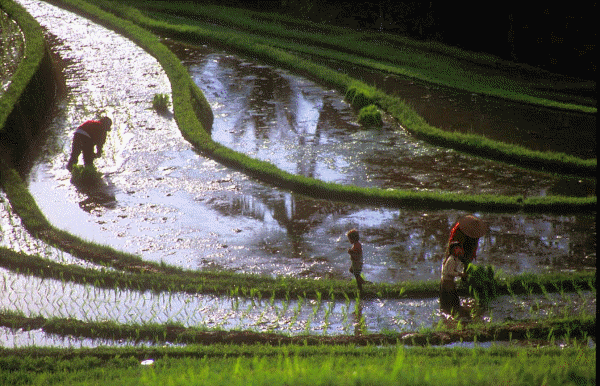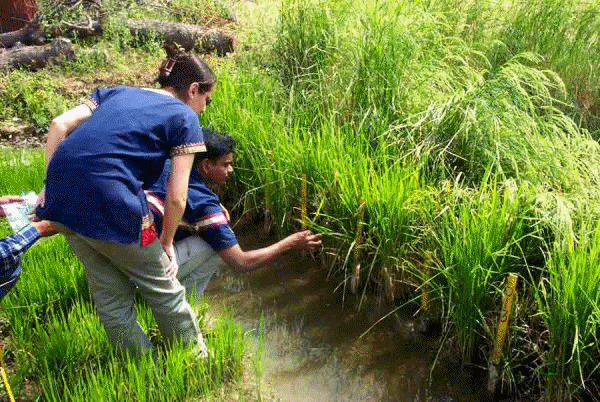
JULY 2006

HUMANITARIAN PRINCIPLES UNDERMINED TOTALLY BY URUGUAY
TRADE TALKS
Where rice can be
used to save lives
The Koreans prefer their
homegrown variety to foreign imports....Sometimes, it is
a matter of quality and health risks; often it relates to
trade restrictions.
By Mathew Maavak
One of the most intractable issues in the ongoing Korea-U.S. FTA talks pertains to agricultural products. A landmark agreement with immense ramifications for the mutual security of both Korea and the United States faces an insurmountable hurdle over rice.
Washington wants lower tariffs and greater market access for its rice. The Koreans prefer their homegrown variety to foreign imports. Rice gets a little personal as it has been consumed the same way, along with the same peculiarities, for more than a millennia.
Such barriers could be surmounted if greater latitude was given to Seoul over the distribution and consumption of U.S. rice. However, every industry has a cartel, and an international framework within which bananas can precipitate a greater deal of rancor than the "state of affairs." That's exactly what's transpiring right now between the Philippines and Australia.
Sometimes, it is a matter of quality and health risks; often it relates to trade restrictions.
Under the regime imposed by the Uruguay Round, a certain percentage of imported agro products has to be assigned to the retail sector, in the hope that somehow, it gets forced fed into the mouths of consumers. If this fails, and if such agro products are left unconsumed, they cannot be redispatched to a third nation under any pretext. And this includes humanitarian aid. In the end, they are destroyed.
This draconian regime is a literal killer for those trapped by conflict and famine. Often, such crisis occurs in third-world nations beset by social turbulence arising from fallen economies. It's a vicious spiral as third-world nations frequently complain that their economies are stilted due to agricultural barriers erected by the developed world.
Development generally occurs in three stages - agricultural, industrial and beyond. If poorer nations can't export their staple, there would be little inflowing capital for industrial development.
Call this social or "international" Darwinism, but it is pretty much retarded to impose an inflexible regime on the most basic of necessities.
South Korea could just as easily reassign U.S. rice to North Korea if they cannot be sold locally within a timeframe. Washington could score a diplomatic coup as well when Made in U.S.A. sacks are ripped up to feed the hard-pressed citizens of the North.
But will the trade regime ayatollahs of this world relent on this matter? They can turn a blind eye to China's rampant copyright piracy time after time at the expense of U.S. and Korean firms, among others. They can turn a blind eye to the nuclear bazaar of A.Q. Khan as well. Agro products however, get the ogre-eyed scrutiny, and punitive actions if the micro-distribution goes awry.
There is plenty of food around but according to the United Nations' Food and Agricultural Organization:
- One in every five people in the developing world is chronically undernourished, a total of 777 million individuals.
- To reach the World Food Summit goal of reducing hunger by half by 2015, the number of hungry people needs to fall by 22 million a year. Currently it is falling by only 6 million a year.
- Fifty-five percent of the 12 million child deaths each year are related to malnutrition.
- More than 2 billion people suffer from micronutrient deficiencies.
Here is something else from an industrial perspective:
"The global loss in social productivity caused by cumulative micronutrient deficiencies amounted to 46 million years of productive life in 1990 alone."
The current regime doesn't take note of that. It has other priorities. The quota set for consumers cannot be shifted to ancillary agro sectors like liquor, fodder and processed foods in an import market.
It is high time both nations clinched a deal where agro products can be jointly used for humanitarian diplomacy, away from trade regimes that only serve to starve.
The United States has made exceptions before. It has a special relationship with Israel over security issues, and another one with India over nuclear technology. Exceptions could be made over more mundane issues.
The trick is to agree on a detailed mechanism where unconsumed products - either way - can be shunted into the humanitarian arena.
Someone's conditioned palate - over a specific rice - can be another's lifeline.
By Mathew Maavak
maavak@heraldm.com
